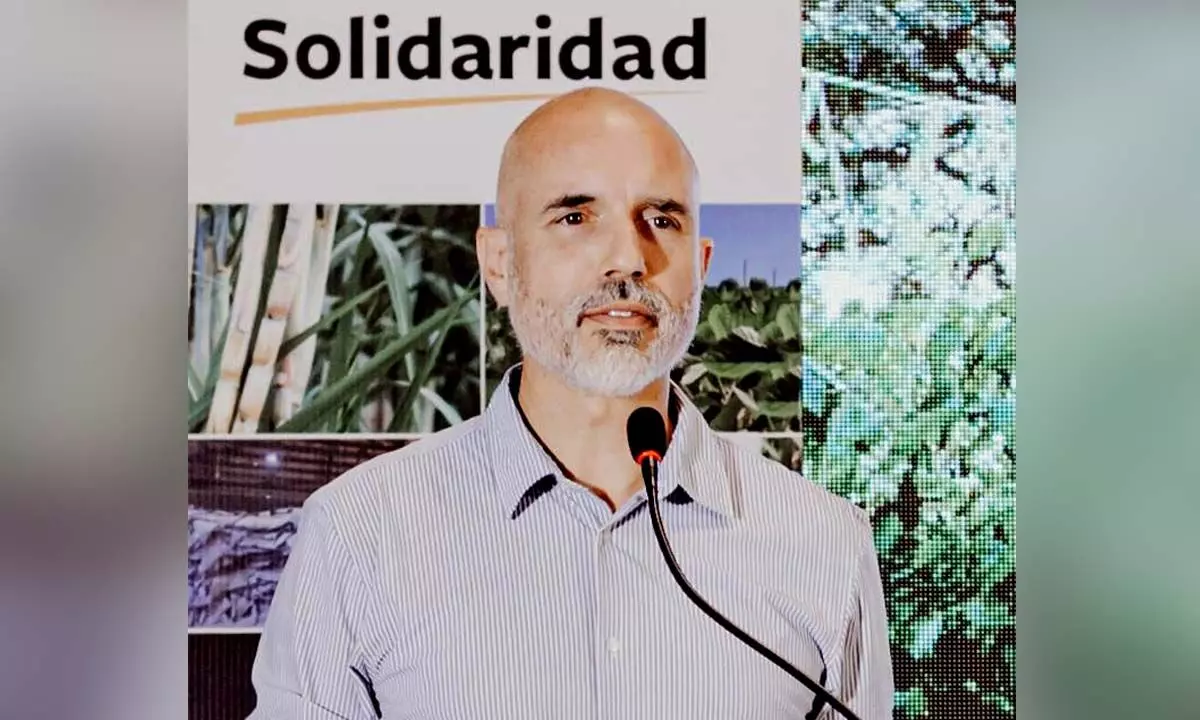Live
- Chanchalguda Jail Officials Say They Haven't Received Bail Papers Yet, Allu Arjun May Stay in Jail Tonight
- BJP leaders present evidence of illegal voters in Delhi, urge EC for swift action
- Exams will not be cancelled: BPSC chairman
- Nagesh Trophy: Karnataka, T.N win in Group A; Bihar, Rajasthan triumph in Group B
- YS Jagan condemns the arrest of Allu Arjun
- Economic and digital corridors to maritime connectivity, India and Italy building vision for future, says Italian Ambassador
- SMAT 2024: Patidar's heroics guide Madhya Pradesh to final after 13 years
- CCPA issues notices to 17 entities for violating direct selling rules
- Mamata expresses satisfaction over speedy conviction in minor girl rape-murder case
- Transparent Survey Process for Indiramma Housing Scheme Directed by District Collector
Just In
Solidaridad leads sustainability efforts in India, empowering 1.5 mn farmers


By prioritising regenerative agri, pollution reduction technology, and rural job creation, Solidaridad has enhanced both environmental outcomes and economic resilience in rural communities
Andre de Freitas, Global Executive Director of Solidaridad, said with its initiatives impacting over 1.5 million smallholder farmers, his organisation is at the forefront of promoting regenerative agriculture, combating industrial pollution, and driving inclusive economic growth.
A sustainability leader
Solidaridad has firmly established itself as a leading sustainability organisation in India, supporting over 1.5 million smallholder farmers through comprehensive and collaborative approaches. Andre de Freitas attributes this success to a multifaceted strategy that integrates sustainable agricultural practices, innovative technologies, and robust partnerships with both local and international stakeholders.
"One of our key achievements has been the establishment of the regenagri certification standard, developed in collaboration with Control Union," de Freitas explains. "This certification helps farmers access premium markets and receive higher prices for their sustainably produced goods." By implementing practices such as crop rotation, cover cropping, reduced tillage, and the use of organic compost, Solidaridad has significantly improved soil health and water management. These practices have not only boosted agricultural productivity but also increased the resilience of farms to climate change.
Strategic priorities for sustainability
Solidaridad's Multi-Annual Strategic Plan (MASP) focuses on four main pillars: promoting regenerative agriculture, combating industrial pollution, fostering inclusive economic growth, and generating rural jobs. De Freitas emphasises that regenerative agriculture is the cornerstone of their strategy, demonstrating that sustainable practices can lead to higher yields and reduced input costs.
"Combating industrial pollution is another critical area," de Freitas states. "We work with industries, particularly in sectors like leather and textiles, to implement pollution reduction technologies." These initiatives aim to reduce water and soil contamination, lower greenhouse gas emissions, and promote circular economy practices.
Generating rural jobs is also a focal point. By promoting sustainable agricultural practices and supporting micro-enterprises, Solidaridad creates new employment opportunities in rural areas. For instance, in Madhya Pradesh, the organisation has supported the establishment of farmer-producer companies that manufacture and sell soy-based products, significantly boosting the local economy.
Engagement with govt and private sector
Solidaridad's engagement with the Indian government and private sector is pivotal in advancing its sustainability agenda. The organisation aligns its work with key government initiatives like the National Mission for Sustainable Agriculture (NMSA) and collaborates with various government bodies to ensure that their projects are integrated into broader national strategies.
"We have strategic partnerships with government bodies, such as the National Mission on Clean Ganga under the Ministry of Water Resources," de Freitas notes. "This partnership addresses environmental issues and demonstrates how sustainable practices can be economically viable and beneficial for industry stakeholders."
Similarly, Solidaridad's collaboration with the private sector is robust. Partnerships with companies like the Aditya Birla Group have enabled the deployment of innovative agricultural technologies, enhancing productivity while reducing environmental impact.
Leveraging tech and innovation
Technology and innovation are crucial enablers of Solidaridad's sustainability initiatives in India. The organisation leverages cutting-edge digital tools and technological solutions to enhance agricultural productivity, reduce environmental impact, and improve the livelihoods of smallholder farmers.
"We deploy hyper-local weather stations and soil sensors that provide farmers with precise information on weather patterns, soil moisture levels, and crop health," says de Freitas. This data-driven approach helps farmers make informed decisions about irrigation, fertilisation, and pest management, optimising resource use and improving crop yields.
Innovation also extends to pollution control in the industrial sector. Solidaridad has developed and implemented cleaner production technologies in the leather and textile industries, including water recycling systems and efficient effluent treatment plants. These technologies not only improve environmental performance but also enhance competitiveness in global markets.
Future role and vision
Looking ahead, Solidaridad envisions itself as a key driver of systemic change in India’s sustainability landscape. The organisation aims to mainstream sustainable practices across various sectors, creating demand for sustainably produced goods and ensuring that these practices are economically viable for farmers.
"Our goal is to catalyse market transformation and advocate for policies that support sustainable development," de Freitas states. By influencing both market dynamics and public policy, Solidaridad aims to create an enabling environment for sustainable practices to flourish.
Call to action
De Freitas concludes with a call to action, emphasising the need for collective effort and commitment from all sectors - government, private enterprises, and civil society. "We can create a resilient and prosperous India by embracing regenerative agriculture, reducing industrial pollution, and ensuring fair trade," he says. "Let’s join forces to make sustainability a cornerstone of our development agenda and lead by example on the global stage."
Solidaridad’s initiatives and strategic priorities offer a comprehensive blueprint for fostering sustainability in India. By integrating technology, forming strategic partnerships, and focusing on regenerative practices, the organisation is paving the way for a sustainable and inclusive future.

© 2024 Hyderabad Media House Limited/The Hans India. All rights reserved. Powered by hocalwire.com






